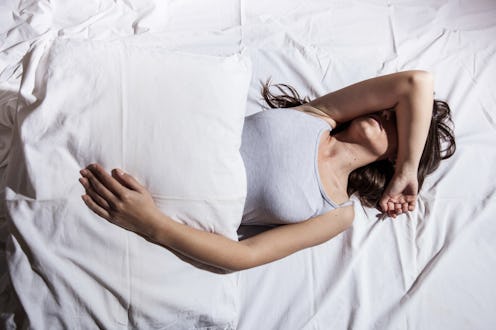The forthcoming supermoon, also know as the Full Cold Moon, isn't likely to turn you into a werewolf, but it could leave you feeling tired and cranky. Yes, the December full moon might mess with your sleep, but whether or not you are affected could be as simple as whether or not you believe that the moon influences sleep cycles. While anecdotal evidence strongly suggests that full moons can disrupt people's sleep cycles, there is no definitive scientific evidence to back up this claim.
Despite the World Journal of Surgery reporting that 40 percent of medical professionals believe that the moon affects human behavior, studies cited in the journal did not find any truth in these superstitions. In fact, it might just be the placebo effect. According to Harvard Medical School, the placebo effect is when something seems to work simply because you think it will. The placebo effect is most often discussed in medical trials when one group of people is given the actual medication, while another is given a sugar pill. However, neither group knows which pill they received.
Harvard Medical School noted that placebos sometimes seem to work as well as actual medications because the people getting the placebo don't know they aren't receiving the real medicine. Basically, because they believe taking the pill will make them feel better, it does. Just like if you believe the full moon will affect your sleep — it will.
Is Full Moon Sleeplessness All In Your Head?
If you apply the logic of the placebo effect to the full moon, it's easy to say that if you think the full moon will cause you to lose sleep, then you are more likely to sleep poorly during a full moon than people who don't believe the moon affects their sleep cycle. Myriad studies have been conducted to attempt to determine whether or not the full moon disrupts people's sleep, but no one study has scientifically proven that the full moon has any effect on sleep patterns.
One study conducted in Switzerland did find that participants monitored over period of three and a half days slept an average of 20 mins less during the full moon, took five minutes longer to fall asleep, and had a 30 percent decrease in deep sleep. However, the study took place in a lab, which could account for the slight decrease in sleep quality — sleeping in a strange place can throw off anyone's sleep cycle. Just think how your sleep quality differs when you're sleeping away from home. Add in being hooked up to monitors while you're trying to get some shut eye, and it's easy to see why these people many have taken longer to fall asleep.
What's more, Ethan Green, founder of the blog No Sleepless Nights, wrote that the full moon sleep study has never been replicated, and the sample of the study was too small to draw any real scientific conclusions. Researchers from the study told CNN that in order to definitively say whether or not the full moon messes with your sleep, a larger of number of people would need to be studied over a period of at least 30 days.
The Moon Messing With Your Sleep Is An Illusion
There's actually a term for believing that the full moon can cause poor sleep quality. In the book Facts and Fictions in Mental Health, authors Hal Arkowitz and Scott O. Lilienfeld noted that University of Wisconsin–Madison psychologists Loren and Jean Chapman defined this phenomenon as “illusory correlation,” the perception of an association that doesn't exist.
You can actually apply this term to anything, like believing that if you step on a crack you'll break your mother's back, but for the purposes of this theory, I'm going to apply it to the belief that your sleep suffers during the full moon. The belief that moon has an effect on human behavior dates back thousands of years, and it's continually reinforced through movies, stories, and folklore. Many people simple accept this as fact and don't bother to do any real investigation to find out if it's true. But, by believing it's true, you — not the moon — might actually be responsible for disrupting your sleep.
Additionally, an article by Tom Jacobs in Pacific Standard cited new studies revealing that even people who have vast knowledge of a topic may still buy into falsehoods if they'e repeated enough. "Statements you've heard many times are easier to process, and this ease leads people 'to the sometimes false conclusion that they are more truthful,' the researchers write. Their key — and disheartening — revelation is that they found examples of this unfortunate dynamic 'even when participants knew better.'"
Falsehoods about the moon have likely been repeated to you over and over since you were a child. And, let's face it — believing in superstitions is fun. However, according to science, if you don't want your sleep to suffer during the December supermoon, all you have to do is stop buying into the belief that it will. Once you do this you should sleep as well as Joey and Chandler did on Friends when they took those naps together.
